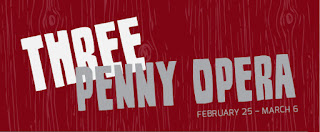 Threepenny Opera opened last weekend at the University of Minnesota Department of Theatre Arts and Dance. It's an ambitious and interesting production, but not one that totally worked for me.
Threepenny Opera opened last weekend at the University of Minnesota Department of Theatre Arts and Dance. It's an ambitious and interesting production, but not one that totally worked for me.I'm no student of world drama, but I understand that the musical by Bertolt Brecht and Kurt Weill, an adaptation of John Gay's The Beggar's Opera, is meant to touch your brain, not your heart. Brecht's Verfremdungseffekt, sometimes translated as the alienation effect, intentionally creates a distance that prevents the audience from sympathizing with the characters. And the characters in Threepenny are definitely hard to like, from murderers and thieves to crooked cops and mercenary women.
This production uses the English translation of the dialogue by Robert Macdonald with English translation of the lyrics by Jeremy Sams, a version first produced at London's Donmar Warehouse in 1994. (This isn't the version that played in New York in 2006 starring Alan Cumming or the 1989 Broadway production that starred Sting.) Rather than the original setting of Victorian London, this script sets the story in the not-too-distant future. At the Donmar Warehouse, the setting was the time of Prince William's coronation as king. The University production refers to King Donald Trump and includes a mishmash of British and American references.
 |
| Photo: Dan Norman Photography. |
Is it possible for a Brecht production to be too alienating? I think it is. This version of the script is loaded with profanity that felt gratuitous. Before the show, actors in costume wander the aisles interacting with audience members, and carry the swearing into their banter. I don't think I'm prudish, but it felt overdone and a little "Look at us, we're edgy!"
 |
| KRL getting artsy with the program. |
In the end, the multiple levels of alienation resulted in me sympathizing with the people on stage - not the characters, but the actors who rose above their surroundings. Even though I didn't care for many of the choices the production makes, I'm sure a student of Brecht and Weill would find much to interest them in this less-familiar version of the show.
Side note: I have to say that one thing I admire in a play is when I'm still thinking about it when it's over. I had a lot to think about after the show, and read quite a bit about the play and its various versions in preparing to write this. It made me really consider the material and what it was I liked and didn't like and why. For a college production, that seems like a success.
